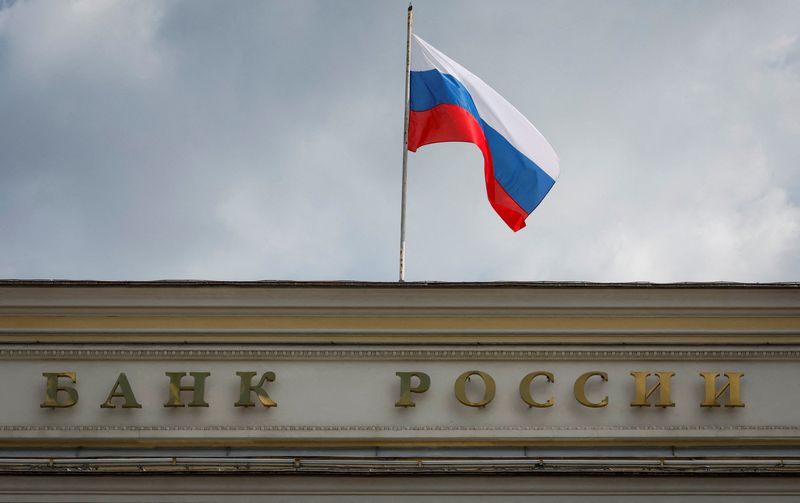By Elena Fabrichnaya and Guy Faulconbridge
MOSCOW (Reuters) - After President Vladimir Putin sent troops into Ukraine in 2022, the United States and its allies prohibited transactions with Russia's central bank and finance ministry, blocking around $300 billion of sovereign Russian assets in the West.
The United States has proposed that working groups from the Group of Seven (G7) major industrialized nations explore ways to seize that money, according to the Financial Times.
What are these assets, where are they and what could Russia do if the assets were confiscated?
CENTRAL BANK RESERVES
Like other central banks, the Russian central bank placed some of its gold and foreign exchange reserves in liquid assets such as major currencies, gold and government bonds. About half of those reserves were held in the West.
The central bank has confirmed that about $300 billion worth of assets have been frozen in the West. Total Russian foreign currency and gold reserves totalled $612 billion at the time
Putin has accused the West of unleashing an economic war against Russia and has called the freezing of the reserves theft.
Central Bank Governor Elvira Nabiullina was criticised by nationalists for allowing such a large chunk of the bank's reserves to be frozen.
WHAT WAS FROZEN?
The Russian central bank has not given a detailed breakdown of what was frozen but a rough outline can be gained from documents detailing Russian holdings at the beginning of 2022.
At that time, Russia's central bank held around $207 billion in euro assets, $67 billion in U.S. dollar assets and $37 billion in British pound assets.
It also had holdings comprising $36 billion of Japanese yen, $19 billion in Canadian dollars, $6 billion in Australian dollars and $1.8 billion in Singapore dollars. Its Swiss franc holdings were about $1 billion.
Russia's central bank said these assets were mainly invested in foreign securities, bank deposits and nostro correspondent accounts.
The banks biggest bond holdings were in the sovereign bonds of China, Germany, France, Britain, Austria and Canada.
Russia's gold reserves were held in Russia.
Investments in yuan are held in China.
HOW WERE THE ASSETS HELD?
Russia's central bank did not hide behind complex chains of nominal holders so identifying the assets will not be difficult.
Most of the assets - including those of private Russian citizens - have been frozen at depositaries.
CONFISCATION?
Russian officials have repeatedly warned that the state confiscation of assets goes against all the principles of free markets.
"Let's see what they decide," one senior Russian official told Reuters on condition of anonymity. "The protection of private property is a sacred cow that has been feeding them for many centuries."
Some Russian officials have suggested that if Russian assets are confiscated then foreign investors' assets stuck in special so-called type "C" accounts in Russia could face the same fate. Some foreign assets were effectively locked in the C accounts.
It is not clear exactly how much money is in these accounts but Russian officials have said it is comparable to the $300 billion of Russian reserves frozen.
Finance Minister Anton Siluanov said last week that there were significant funds on the C accounts.

Kremlin spokesman Dmitry Peskov told reporters last week that Russia would challenge any confiscation in the courts.
"If something is confiscated from us, we will look at what we will confiscate," Peskov said. "We will do this immediately."